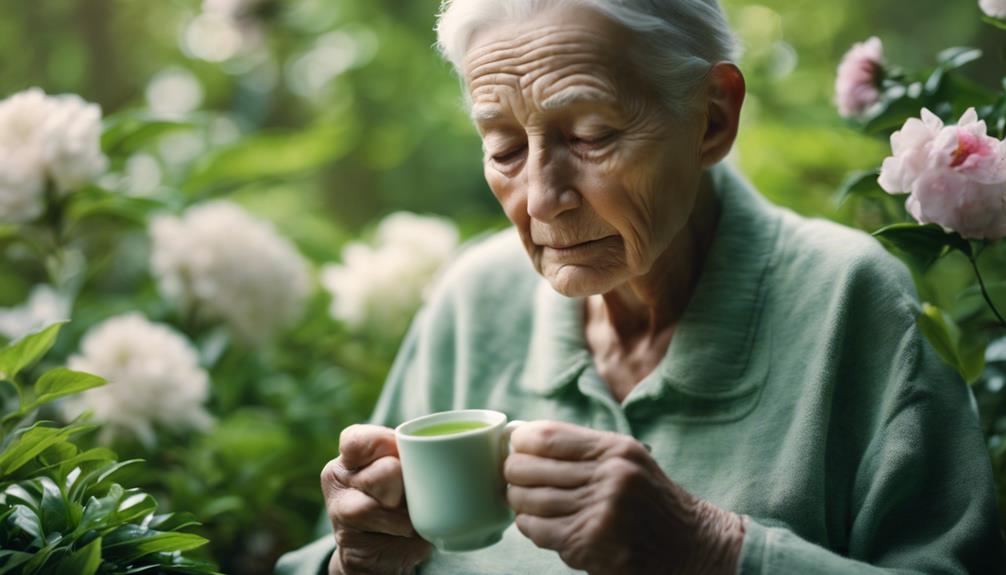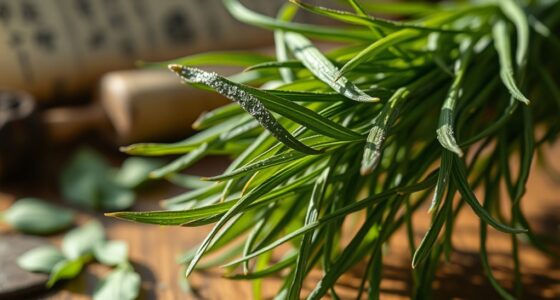Green tea, oolong tea, black tea, white tea, and Pu-erh tea are linked to increased lifespan. Green tea's catechins combat inflammation and protect against chronic diseases. Oolong tea boosts heart health and may enhance mental focus. Black tea reduces mortality risk and offers cardiovascular protection. White tea's antioxidants combat aging by reducing oxidative stress. Pu-erh tea, with its microbial properties, improves heart health and aids weight management. Herbal teas like matcha also provide health benefits. Each tea offers unique properties that contribute to longevity and overall well-being. Discover more about these teas and their effects on lifespan.
Key Takeaways
- Green tea enhances longevity with antioxidants and anti-inflammatory properties.
- Oolong tea supports longevity through antioxidants like theaflavins and catechins.
- Black tea consumption lowers mortality risk, especially for cardiovascular issues.
- White tea's antioxidants combat aging, protect skin, and promote overall well-being.
- Pu-erh tea aids longevity with microbial properties, heart health benefits, and antioxidants.
Green Tea's Lifespan Benefits
Green tea enhances longevity by providing numerous health benefits that include reducing the risk of chronic diseases and promoting overall well-being. Catechins, a type of natural antioxidant found in green tea, play an important role in combating inflammation and protecting the body against various health conditions. These powerful compounds contribute greatly to the longevity benefits associated with green tea consumption.
The antioxidant properties of green tea further enhance its ability to protect overall health and well-being, making it a valuable addition to a balanced diet.
Research indicates that the polyphenol content in green tea offers cardiovascular protection, reducing the risk of heart disease and stroke. Regular consumption of green tea has been linked to a lower incidence of chronic diseases such as cancer and diabetes. By incorporating green tea into our daily routine, we can potentially extend our lifespan and improve our overall health outcomes.
Health Effects of Oolong Tea
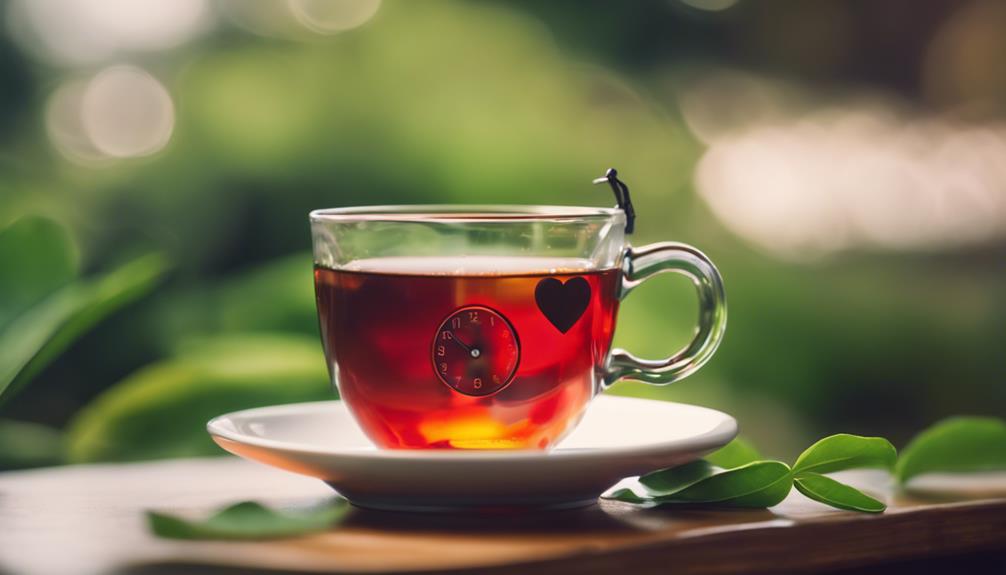
Rich in antioxidants and known for its unique flavor profile, oolong tea offers a range of health benefits that make it a popular choice among tea enthusiasts.
Oolong tea, a partially oxidized tea, contains antioxidants like theaflavins and catechins, which help protect cells from damage and reduce inflammation. Studies suggest that regular consumption of oolong tea may support heart health by improving cholesterol levels and reducing the risk of cardiovascular diseases.
Additionally, oolong tea has been linked to improved mental alertness and focus, providing a natural energy boost without the jitters associated with other caffeinated beverages. For those looking to manage their weight, oolong tea could be beneficial as it may boost metabolism and reduce fat absorption.
With its combination of health benefits and unique taste, it's no wonder that oolong tea has gained popularity among individuals seeking to enhance their overall well-being.
Black Tea and Longevity
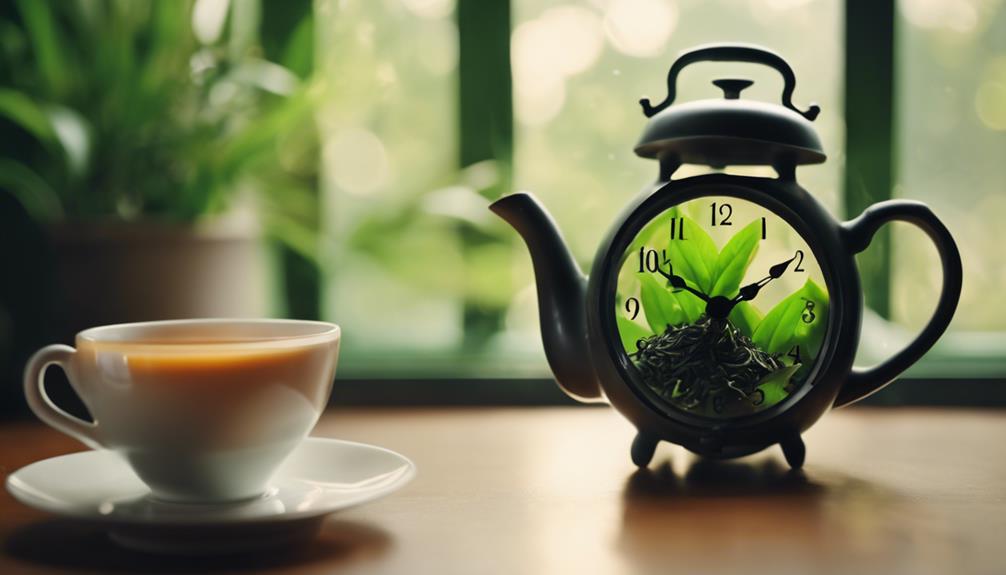
Our exploration of the link between black tea consumption and longevity reveals compelling evidence of its potential health benefits. Black tea has been associated with a 9-13% lower risk of premature death in middle-aged adults. This reduced mortality risk is attributed to the presence of theaflavins, compounds found in black tea known for their health benefits.
Regularly consuming 2 or more cups of black tea daily is linked to decreased mortality risk.
A study evaluating the tea-drinking habits of 500,000 middle-aged individuals in the UK found that 89% consumed black tea.
Black tea drinkers may experience a lower risk of dying from stroke, coronary heart disease, and other cardiovascular issues.
These findings suggest that incorporating black tea into one's daily routine could potentially contribute to a longer and healthier lifespan.
White Tea's Anti-Aging Properties
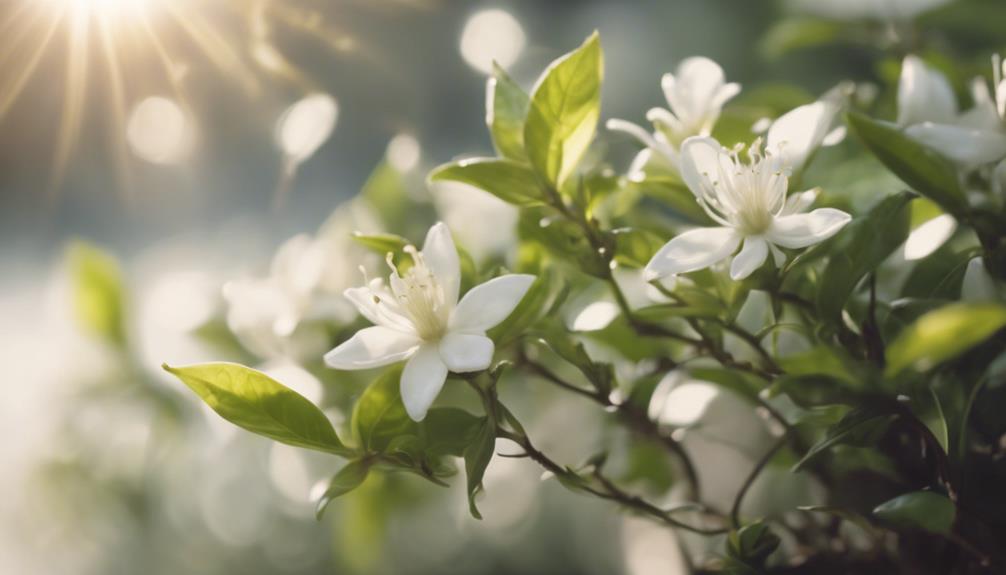
White tea's high levels of antioxidants make it a vital ally in combating aging by reducing oxidative stress and inflammation in the body. The polyphenols found in white tea play an essential role in protecting the skin from harmful UV damage, thereby minimizing the appearance of wrinkles and age spots. Additionally, white tea is known to stimulate collagen production, which enhances skin elasticity and diminishes fine lines, contributing to a more youthful complexion.
Regular consumption of white tea not only promotes skin health but also delays the onset of age-related skin issues, making it a popular choice for individuals seeking anti-aging properties.
The anti-aging benefits of white tea extend beyond skin health, as its antioxidant properties help combat oxidative stress throughout the body, potentially increasing longevity. By reducing inflammation and protecting against cellular damage, white tea acts as a natural defense mechanism against the effects of aging, offering a holistic approach to maintaining overall well-being and promoting a youthful appearance.
Pu-erh Tea for Longevity
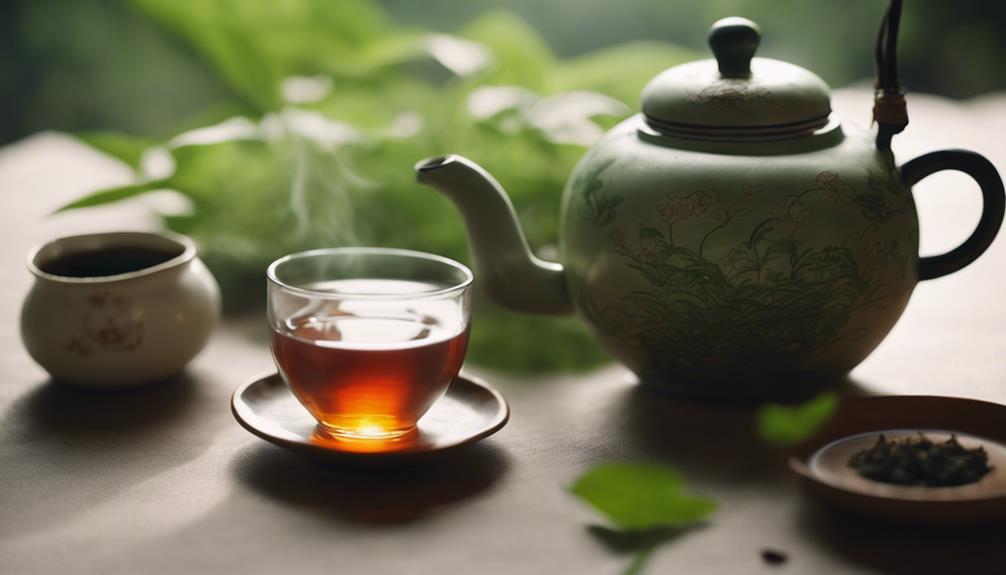
Believed to have longevity benefits, Pu-erh tea is a fermented dark tea originating from Yunnan province in China. This unique black tea boasts a range of health advantages that may contribute to a longer and healthier life.
Here are some key points about Pu-erh tea:
- The fermentation process of Pu-erh tea gives it microbial properties that set it apart from other teas, potentially enhancing its health benefits.
- Studies suggest that regular consumption of Pu-erh tea can improve heart health by reducing cholesterol levels, an essential factor in longevity.
- Rich in antioxidants, Pu-erh tea may aid in weight management, promote better digestion, and help lower risks of certain chronic diseases, aligning with its reputation for supporting longevity.
The combination of its fermented nature, antioxidant content, and potential to improve heart health make Pu-erh tea a promising option for those seeking to enhance their overall well-being and potentially extend their lifespan.
Herbal Teas for Long Life
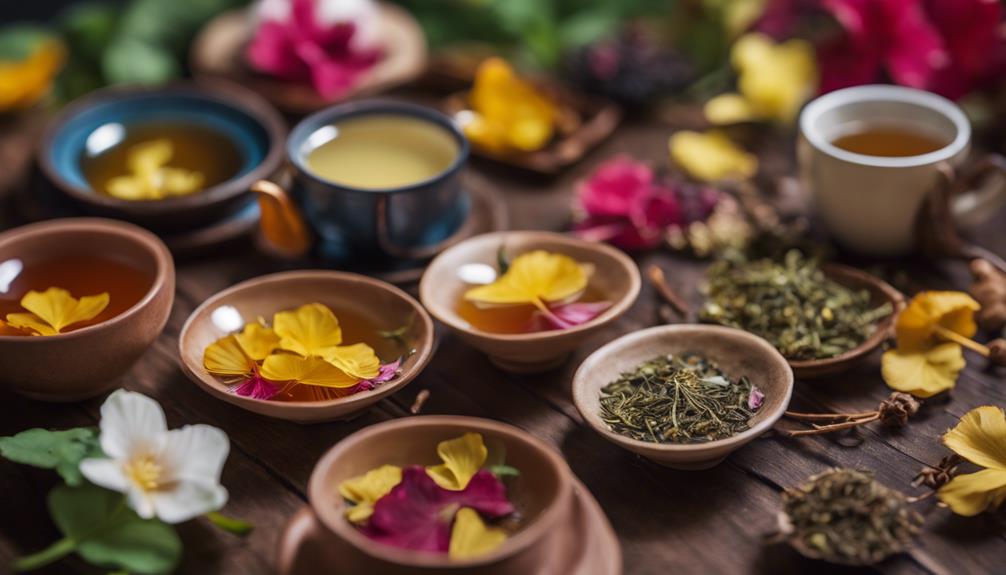
Green tea, chamomile tea, ginger tea, peppermint tea, and hibiscus tea are herbal options believed to promote longevity and overall well-being.
Green tea, rich in antioxidants and anti-inflammatory compounds like catechins, has been associated with reducing inflammation, lowering the risk of chronic diseases such as cancer and diabetes.
Chamomile tea, with its antioxidant and antibacterial properties, can improve sleep quality, boost immunity, and support digestive health.
Ginger tea, containing gingerols, may assist in motion sickness, cancer prevention, blood pressure regulation, and diabetes management.
Peppermint tea, with menthol, helps relax the intestinal tract, alleviate bloating, and aid digestion.
Hibiscus tea is known to lower blood pressure, combat obesity, and reduce the risk of heart disease, diabetes, and cancer.
Incorporating these herbal teas into your daily routine may offer various health benefits, from improving sleep quality to reducing the risk of chronic conditions.
Matcha Tea and Aging
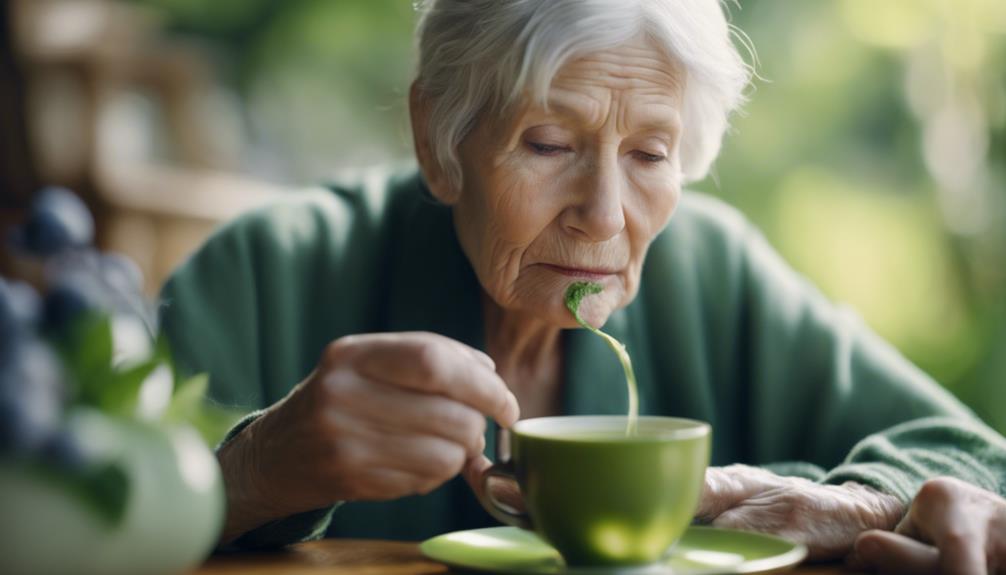
Matcha tea, a type of green tea rich in powerful antioxidants called catechins, has been recognized for its remarkable effects on aging and longevity. This vibrant green tea variety offers a multitude of benefits that can positively impact the aging process and contribute to a longer, healthier life.
- Matcha tea is packed with potent antioxidants, such as catechins, that combat inflammation and lower the risk of chronic diseases like cancer and diabetes.
- The high concentration of catechins in matcha tea plays an essential role in slowing down the aging process by shielding cells from damage caused by free radicals.
- Regular consumption of matcha tea is linked to improved metabolism, aiding in weight loss, enhancing detoxification processes, and ultimately supporting a healthier lifespan.
With its ability to protect against cellular damage, reduce inflammation, and improve overall health, incorporating matcha tea into your routine could be a beneficial step towards promoting longevity and well-being.
Frequently Asked Questions
What Tea Helps You Live Longer?
Green tea, with its rich polyphenols, is our go-to choice for a longer, healthier life. It's linked to lower risks of heart disease and stroke. Regular green tea consumption has shown significant health benefits, bringing us more years of well-being.
What Tea Is Anti Aging?
When looking at anti-aging properties in tea, options like green, chamomile, ginger, peppermint, and hibiscus are beneficial. They offer antioxidants, aid in digestion, lower blood pressure, and combat inflammation, contributing to overall health and longevity.
Do Coffee or Tea Drinkers Live Longer?
We found out that habitual tea drinkers had a 20% lower risk of heart disease and stroke, showing a potential benefit for longevity. When comparing coffee and tea drinkers, tea enthusiasts tend to live longer.
Can Drinking 3 Cups of Tea a Day Help You Live Longer?
Drinking 3 cups of tea a day can potentially help us live longer, based on research linking tea consumption to increased healthy years of life and reduced risk of heart disease and stroke.
Conclusion
To sum up, various types of tea have been shown to offer potential benefits for increasing lifespan and promoting longevity. Green tea, oolong tea, black tea, white tea, pu-erh tea, herbal teas, and matcha tea all contain compounds that have been linked to anti-aging properties and overall health benefits.
Incorporating these teas into your daily routine could potentially contribute to a longer and healthier life, making them a valuable addition to any wellness regimen.

